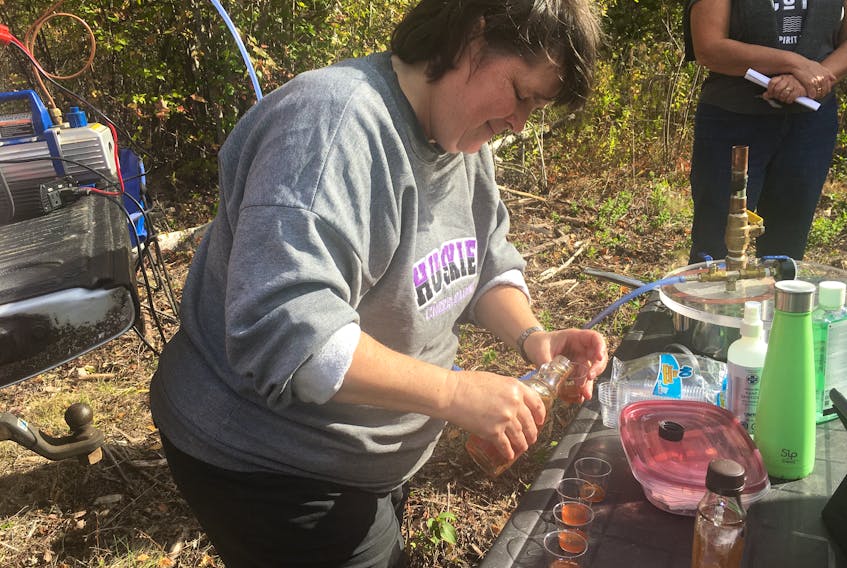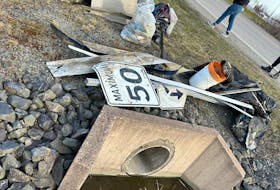SHINIMICAS, N.S. - Soon after purchasing a small 40-hectare woodlot near Shinimicas several years ago, Norman and Stacey Paupin began looking for non-traditional uses for it.
With their baby steps toward the development of a birch syrup industry in Nova Scotia they may have accomplished just that. The Folly Lake couple were recognized recently by Nova Scotia Lands & Forestry for their commitment to sustainable forest practices and an eye for innovation as the provincial Woodlot Owners of the Year for 2020.
“This is not what we were out to do by any means so it’s sort of surreal,” Norman Paupin said after he and his wife accepted the award during an open house on Oct. 3. “We’re more used to sitting in the back and doing the work. This is not something we’re familiar with.”
Paupin’s love of the forests began as a young child when he would go into the woods with his father and grandfather to collect firewood and select trees for boatbuilding.
Now, he is back in the woods using solar powered pumps to collect sap and he has adapted technology to make birch syrup, which sells for a higher price than maple syrup. He has worked to continuously refine his process to produce a syrup that won a world birch syrup championship in Russia in 2018.
Norman, who teaches at the Waterfront Campus of NSCC in Dartmouth, said he and Stacey purchased the woodlot as a source of firewood to heat their home, as a way to get exercise and as an investment.
“Our approach has been to take what was there and make every attempt at improving its overall value,” he said. “To us, it has more than economic value; it is a quiet place to walk, to appreciate the trees themselves, to observe wildlife and just enjoy nature and think. It has allowed us the opportunity to experiment with some pretty awesome ideas.”
It was during one of those walks that Norman came up with the idea of producing birch syrup. While doing research on maple syrup he “tripped” over birch syrup.
“I didn’t know anything about maple syrup, let alone birch syrup,” Paupin said. “I wondered who would ever do anything with that? It was intriguing.”
The first year he and his wife did just a little bit of birch syrup, resulting in a thick and dark tar-like substance that didn’t taste very good.
“I wondered why anyone in their right mind ever want to do that? I did a bit more research and learned it’s a completely different,” he said. “Being naïve was a bit of a bonus because it allowed us to experiment and play with it until we got something that was much lighter and sweeter.”
Stacey shares her husband’s vision of diversifying their woodlot.
“A lot of people look at their woodlots and only see the trees. We’ve always wanted to do more, there’s so much value here,” she said. “He saw it on the internet, tapped a few trees and didn’t like it. He did some more research and tapped a few more and then repeated the process.”
The Paupins went to an international birch syrup conference in New York several years ago to which he brought a small bottle of syrup to a taste-testing event, adding he felt a bit like a guy hiding a rum bottle in his coat.
“I sort of became the person in the room that everyone was pointing at. Some were interested and some thought I was evil,” he said.
It was at the conference he learned about vacuum evaporation that allows him to boil the sap at a lower temperature to avoid burning the sap and giving it a taste that’s not quite as sweet as maple syrup but less bitter than his earlier attempts.
He also shared the syrup with a friend who teaches in the NSCC’s culinary program. He suggested Paupin was on the right track and encouraged him to continue working at it.
He is now working with a researcher at the Dalhousie University’s Agricultural Campus in Truro to further develop the process.
“We’re not into a business yet. It’s completely experimental, but at the same time I think there’s potential there,” said Paupin. “We have a lot of work to do.”
One of the challenges is having access to capital since most programs are geared for existing businesses, something he and his wife have yet to establish.
“How can you make the innovation leap to actually figure out if there is a business case without there being a business? I’ve explored those roads and you’re so busy trying to figure out the business side of things you can’t work on innovation. It’s a problem we need to figure out, how to get these little ideas, do the research, get some of the equipment to get to a small commercial phase to figure some of the numbers out. Then we can get into the business plans.”
Paupin said right now it’s something that’s really just at the idea stage in Nova Scotia, but he thinks it’s doable.
Birch syrup is seldom used for pancake syrup. Mostly, it’s used as an ingredient paired with pork or salmon dishes in sauces, glazes and dressings or flavouring in ice cream, beer or wine.
It’s more difficult to make than maple syrup, requiring 100 to 110 litres of sap to make one litre of syrup. In comparison, maple syrup requires approximately 40 litres of sap to make a litre of syrup.
As well, the tapping season for birch syrup is traditionally shorter than maple and happens later in the year. Like maple syrup, reverse osmosis and evaporators are used in production, but birch syrup is more heat sensitive.
Most birch syrup is produced in Russia, Alaska and parts of Canada such as Manitoba, Ontario and Quebec.









